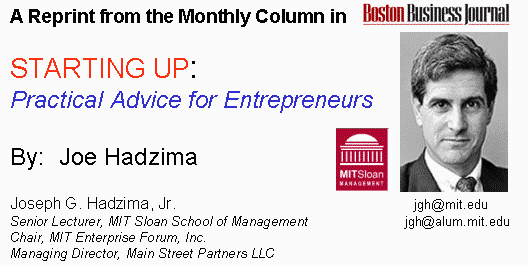

Pinpointing That Critical Entrepreneurial Spark
(Click Here for a PDF Version of This Article)
So you want to start a company. Do you think you are an Entrepreneur?
Do you have a Passion to succeed?
Entrepreneurs are driven to succeed. They will figure out ways to go over, under, around, or through obstacles to reach their goal. Entrepreneurs leave the impression that they are going to succeed, that their train is leaving the station and they will be on it, one way or another.
Ask yourself whether you are leaving your current position because of something there, or because you have the passion to do something innovative.
Can you focus on success and set clear goals and accomplish them?
Because nothing succeeds like success, are you capable of sacrificing the perfect situation in order to generate some near-term successes that you can leverage?
Entrepreneurs usually are not distracted by details that are not important to achieving the task at hand. That is usually the opposite of what it takes to succeed in a larger, more rigid organization. Warning: Those who have this trait should make sure they get someone working with them who will worry about the details, without dragging the effort down.
Can you deal with STRESS? Start-ups can be very stressful.
One of my start-up clients is a company founded by a former Digital employee and former Data General employee, both in their 40s. Each held very responsible positions with their prior employers and both worked long hours. They admit that they did not really understand stress until they started their own company.
“At DEC I never woke up in the middle of the night in a sweat, unable to get back to sleep,” says the entrepreneur-client.
Not all founders face that level of stress. The point is: Are you ready for stress and, perhaps more important, are your spouse and children ready?
A roller coaster metaphor is appropriate for several reasons. A roller coaster provides highs and lows. Are you capable of managing such extremes? The highs and lows of a roller coaster usually come in rapid succession. Start-ups can also face rapid changes, and you have to be ready for them.
Are roller coasters risky? Thrilling, perhaps; but not commonly thought of as being risky. Jumping out of an airplane without a parachute- now that is risky!
Although people often say that entrepreneurs are risk-takers, most entrepreneurs don’t jump out of airplanes without knowing what they are doing. While they’re not afraid to undertake projects that might fail, they also work to minimize risk.
Are you an Innovator?
Entrepreneurs look at problems and craft new ways of doing things. Jonathan Harber was a co-founder of Digital Video Applications Corp. or DiVA, a company that developed and marketed digital video-editing software for the Macintosh. At the seminar series organized for entrepreneurs at MIT in January, Harber told how he set a “zero budget” marketing policy for DiVA. “If it cost money, we wouldn’t do it,” he said, proudly.
The result? DiVA managed to attend tradeshows by appearing at other companies’ booths. DiVA also got Ben & Jerry’s to beta test DiVA’s product and to donate its ice cream bars as a promotion for DiVA’s product at tradeshows. A larger corporation using traditional approaches to marketing would probably have spent $100,000-with-out achieving the same impact.
Can You Build A Team?
Entrepreneurs often think and act differently, but the most successful ones are not loners.
MIT Sloan Professor Ed Roberts in his book “Entrepreneurs in High Technology” (Oxford Press), reports on research that shows that entrepreneurial teams of three or more persons have a higher probability of success.
Are you capable of identifying your strengths and weaknesses? Are you capable of finding and motivating persons with complementary skills?
Are You A Control Freak?
Many people leave larger companies because they want to be their own boss. The simple fact is that no one is really his or her own boss. An entrepreneur must answer to many people, including customers, investors, and employees. Entrepreneurs, however, probably will have more control over their situation than they did in a larger company. But they shouldn’t look to control for control’s sake. Ask yourself: “Am I a control maniac?” If so, ask yourself if you would like to work with- and for- somebody like you.
If you have answered these questions to your satisfaction and have not been dissuaded from starting a new venture, here are some homework assignments:
-Hang out with people interested in entrepreneurial ventures. For example, attend the MIT Enterprise Forum, the WPI Forum at Worcester Polytech, and the 128 Venture Forum.
-Read extensively about entrepreneurial efforts in newspapers.
-Join the entrepreneurial network. Talk to people. Get on Mailing Lists from the big accounting firms, law firms, etc.
-Read biographies- not only of today’s entrepreneurs, but also of those who have innovated in the past. Ask yourself what traits the person had that enable him or her to succeed. How did the person handle failure?
-Above all, constantly plumb your soul and consider what motivates you to start and grow a company.
DISCLAIMER: This column is designed to give the reader an overview of a topic and is not intended to constitute legal advice as to any particular fact situation. In addition, laws and their interpretations change over time and the contents of this column may not reflect these changes. The reader is advised to consult competent legal counsel as to his or her particular situation.
Copyright 1994-2005, Joseph G. Hadzima Jr., All Rights Reserved.